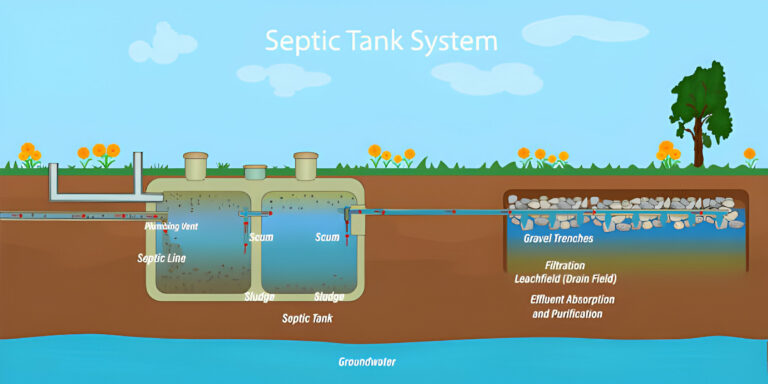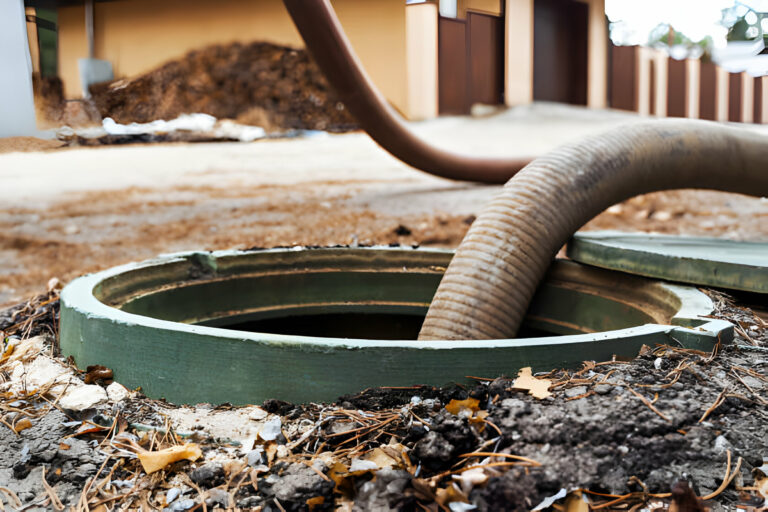As per data from the Environmental Protection Agency, over 20 percent of American households don’t connect to a city sewage system. Instead, they choose individual septic systems or small community cluster systems to manage their wastewater.
If you’ve got a septic system, it’s crucial to grasp its inner workings and get acquainted with the commercial septic tank maintenance chores that can go a long way in preserving its lifespan.
Although maintaining a septic system may sound like a challenging task, with regular care, you can save time, money, and potential headaches. In this comprehensive guide, we’ll explore the ins and outs of septic system maintenance, covering everything from understanding the basics to dos and don’ts and the importance of professional inspections.
Understanding Your Septic System
Before diving into septic system maintenance tips, it’s important to understand what a septic system is. This system manages all wastewater from a house not connected to a city sewage system, consisting of a drain line, a tank, and a drain field. The tank plays a pivotal role, containing bacteria that break down solids into sludge and liquid waste.

Here's How to Maintain Septic System
Maintaining a septic system is vital for properly functioning a household’s waste disposal infrastructure and preventing costly repairs or environmental contamination. By following a few simple steps and implementing regular maintenance practices, homeowners can ensure their septic system operates efficiently and effectively. Let’s explore the essential tasks involved in maintaining a septic system to preserve its longevity and functionality.

Set a Regular Maintenance Schedule
The worst thing that you can do is to not pump your septic tank at regular intervals. It leads to a solid waste buildup, which reduces the holding capacity of the tank and causes an overflow of harmful waste into your leach field.
Therefore, establishing a regular effluent pump cleaning and tank pumping schedule is vital. Ideally, you should pump your tank every 2 to 5 years to prevent solid waste buildup, ensuring the system’s longevity and preventing contamination. If it’s already been more than two years since you last pumped your tank, start searching ‘septic cleaning in my area’ or simply give a call to the best septic system cleaners.
Inspect for Cracks and Leaks
Never disregard any signs of cracks and leaks around your septic system. They can lead to much bigger and more costly problems if not taken care of timely.
(Here’s a tip: Thick and lush grass around the tank may indicate leaks and foul odors are serious RED flags to watch out for.)
Apart from that, also make sure to schedule a professional inspection every 1 to 3 years. No matter how good you inspect, there is always a possibility of missing out on potential threats. At the same time, professional septic system cleaners have a keen eye and can catch potential issues before they cause chaos in your household.
Maintain the Drainfield
The drain field comprises a bunch of pipes working to spread water into the soil. Imagine it as a sensitive area – it doesn’t like heavy stuff on top! So, keep clear of parking your vehicles or piling on too much weight above this leach field. A smart way to do this is by marking the drain field clearly when your system gets set up to steer clear of unintentional squishing.
Limit Household Water Usage
Everything has got a limit. Yeah, your septic tank, too, has its limits. Excessive wastewater can turn the tables badly. But fear not! You can keep the peace by being mindful of your water use at home or by picking the right-sized tank before installation. If your place is party central and guests are frequent flyers, go for the bigger tank.
Here’s a quick tip: before tank shopping, figure out how many gallons of wastewater your home disposes of daily. Just multiply that by 1.5, and voila! You’ve got the perfect-sized septic tank for a smoothly working septic tank.
Direct Rainwater Away
Prevent drainfield issues by redirecting rainwater away from the leach field. If your drain field gets flooded, it might throw a home tantrum – slow drains, toilets playing hard to flush, and floor drains staging a backup rebellion.
Let's Talk about What You Should Not Do
Now that you know septic system maintenance tips, let’s talk about things you should refrain from to avoid googling “best septic cleaning in my area.”
To ensure smooth working of your septic system, don’t:
Use a garbage disposal: It reduces the efficiency of your septic system by eliminating necessary bacteria. Limit its use to avoid more frequent pumping.
Put chemicals down the drain: Chemicals can disrupt the bacteria balance in the septic tank, leading to malfunctions. Instead, use a baking soda and vinegar mixture to drain, unclogging without harming your system.
Park Vehicles on the System: This can lead to system stress and potential cracks.
Flush Abnormal Items: Toilet paper is the only safe item to flush. Items like wipes, feminine products, and paper towels can lead to clogs and should be disposed of in the garbage.
Cost of Septic Maintenance
Investing in septic maintenance is cost-effective compared to repairs. A professional inspection can cost anywhere from $100 to $900, while tank pumping ranges from $300 to $600. Regular maintenance expenses may total up to $1000 every few years, a small price compared to potential system failures.
(Related Article: Click here to know the cost of installing a septic system in 2024)
Can I Clean a Septic Tank Myself?
While cleaning a septic tank is possible, doing it wrong can lead to damage. Professional septic system cleaners at Leaveittoous have the right equipment and experience to prevent harm and environmental pollution. DIY approaches might drain your wallet more in the long run. Therefore, it is recommended that you look for a commercial septic tank maintenance company.
Final Thoughts
Regular septic system maintenance is essential for a healthy home and environment. By following these tips and investing in professional inspections, you ensure your septic system functions efficiently, saving you from costly repairs and potential environmental hazards.

